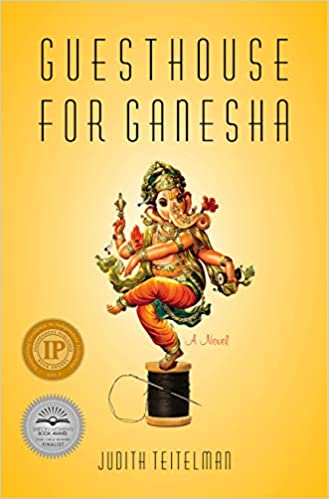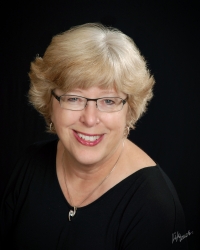Judith Teitelman, author — An Interview
The evolution of a novel can occur in a variety of ways. For Judith Teitelman, award-winning author of Guesthouse for Ganesha (She Writes Press, 2019), it was the title of the book that swirled in her mind long before the story revealed itself. In fact, it took Judith 18 years from titling her story to publishing the book. 
As such, I was so pleased when Judith agreed to be part of a research project I had underway focusing on nine writers who published their first books after the age of 60. Since I could only include a snippet from each of those interviews in Better Later than Never, the full interview with Judith is below for your reading pleasure. Of course, that is, along with reading Guesthouse for Ganesha.
Combining literary fiction with magical realism, Guesthouse for Ganesha tells the story of seventeen-year-old Esther Grünspan, who in 1923, arrives in Köln “with a hardened heart as her sole luggage.” Thus begins a twenty-two-year journey—woven against the backdrops of the European Holocaust and the Hindu Kali Yuga (the “Age of Darkness” when human civilization degenerates spiritually)—in search of a place of sanctuary. Throughout her travails, using cunning and shrewdness, Esther relies on her masterful tailoring skills to help mask her Jewish heritage, navigate war-torn Europe, and emigrate to India.
Esther’s traveling companion and the novel’s narrator is Ganesha, the elephant-headed Hindu God worshipped by millions for his abilities to destroy obstacles, bestow wishes, and avenge evils. Impressed by Esther’s fortitude and relentless determination—born of her deep, though unconscious, understanding of the meaning and purpose of love—Ganesha, with compassion, insight, and poetry, chooses to highlight her story because he recognizes it is all of our stories: for truth resides at the essence of its telling.
Weaving Eastern beliefs and perspectives with Western realities and pragmatism, Guesthouse for Ganesha is a tale of love, loss, and spirit reclaimed.
Q. Why did it take you until you were 60 to write and publish your book?
A. (Judith responded to this question by saying because her journey took 18 years, it’s a common question she’s asked. So, she directed me to an insightful article she wrote entitled, “18 Years, But Who’s Counting,” that was published by CulturalDaily.com in 2019. While you can find that article and others Judith has written for CulturalDaily.com, I’ve provided excerpts here for your convenience.)
In that article, Judith writes: “I spent nearly eleven years, betwixt and between consulting and teaching and travel and daily life, writing—and then rewriting—and then rewriting some more—my novel. This was followed by the search for my literary agent, which took an additional year and seven months—‘the fast track,’ I learned from numerous fellow writers. Then, another three plus years to find my ideal publisher, and nearly two years to publication from there.
She further warns: “Writing—and finishing—a novel, and then undertaking the necessary efforts to get it out in the world is not for those who thrive on and demand immediate gratification…”
Q. What in your personal experience/career made its way into your story?
A. “I’m really yet another ‘Accidental Novelist.’ I never intended to write fiction. I’ve always been a good writer—my exceptional high school English teacher ensured that—and I have a lifetime of papers, reports, proposals, and articles that I’ve authored, many of which have been published in various professional journals in different formats—paper, online, etc. Yet, I never had the desire to be a creative writer.
“But life’s journeys take us in a myriad of different directions—often to places we don’t anticipate or imagine. Essentially that’s what happened to me in 2001. A dear friend started a new writers’ group on Saturday mornings and, basically, dragged me into it. And I hated it. But I showed up—every Saturday morning at 10am with my soy latte in one hand and my notebook and pens in the other. Because I committed, and I honor my commitments.
“It was there that I discovered that this story had been percolating within me for a very long time. In the first month or so of those Saturday mornings, I realized that I had a title in my head. A title I didn’t understand and had no idea of its origin. I spent quite a few Saturdays trying to understand it, to decipher it. Until a friend’s passing led me to an old journal of mine where I found an inscription (nothing leading up to it; nothing of significance noted after) dated 25 June 1983 that read: The title is Guesthouse for Ganesha. Needless to say, I was shocked.”
Q. If you could change anything about your writing life (writing career), what would it be and why?
A. “So much in life is about time and timing.
“Somewhere along the way, I understood this story was bigger than me, and I had to respect its evolution. It’s clear to me that if I had rushed to finish, the novel would in no way be of the quality or caliber I intended and strived for. This was not a story to rush, but one to marinate.
“I’ve learned so much in this process: most importantly to take the long view—the longer it took me to complete the novel, the better I became at my craft.”
Q. What advice would you give to those who come behind us?
A. If there’s a story within you that you’re burning to tell, do it. No matter your age. No matter how long it takes. You’re never too old, and it’s never too late.
Guesthouse for Ganesha is available as an eBook, audiobook, and of course, paperback! For your convenience, here is one link.
You can also follow Judith at:
Website: guesthouseforganesha.com
Facebook.com/judithteitelman
Instagram: judithteitelman
Twitter: @JudithTeitelman
.png)

_w200_h/A%20Whale%20of%20a%20Murder%20Front%20Cover%20(1)_02240335.png)